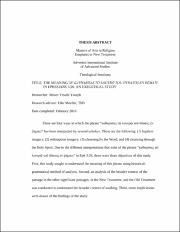| dc.description.abstract | There are four ways in which the phrase ―θαζαξίζαο ηῷ ινπηξῷ ηνῦ ὕδαηνο ἐλ ῥήκαηη‖ has been interpreted by several scholars. These are the following: (1) baptism imagery, (2) redemption imagery, (3) cleansing by the Word, and (4) cleansing through the Holy Spirit. Due to the different interpretations that exist of the phrase ―θαζαξίζαο ηῷ ινπηξῷ ηνῦ ὕδαηνο ἐλ ῥήκαηη‖ in Eph 5:26, there were three objectives of this study. First, this study sought to understand the meaning of this phrase using historical-grammatical method of analysis. Second, an analysis of the broader context of the passage in the other significant passages, in the New Testament, and the Old Testament was conducted to understand the broader context of washing. Third, some implications were drawn of the findings of the study.
The meaning that was determined from the analysis of the passage was a
cleansing imagery that points to Christ‘s salvation and redemption, as proclaimed by the
word God. This was consistent with the syntactical and the grammatical analysis, the
context of the passage, and the context of Ephesians. Paul was seen to be comparing the
sacrificial love of Christ towards the church, in His death, with the love that the
husband‘s should have for their wives. This expression was preferred above all the other
interpretation.
The major contribution was also seen in the biblical context, where washing was
used primarily as a metaphorical imagery of the cleansing that Christ gives, to those who
believe in the New Testament. Second in the Old Testament, washing in relation to moral
impurity was related to repentance and cleansing imagery as well. Though it was clear
that no ablutions could cleanse one of their moral impurities, the washing that was
effected by God upon believers was seen as having a cleansing effect to their moral
iniquities. Furthermore, some texts suggested a messianic hope of this cleansing, which
was to be fulfilled in Jesus. There were also some theological implications that were seen
as the result of the study. These were in relation to some themes in soteriology, especially
in relation to baptism. Second, some implications were seen in the roles of husband and
wife. | en_US |

